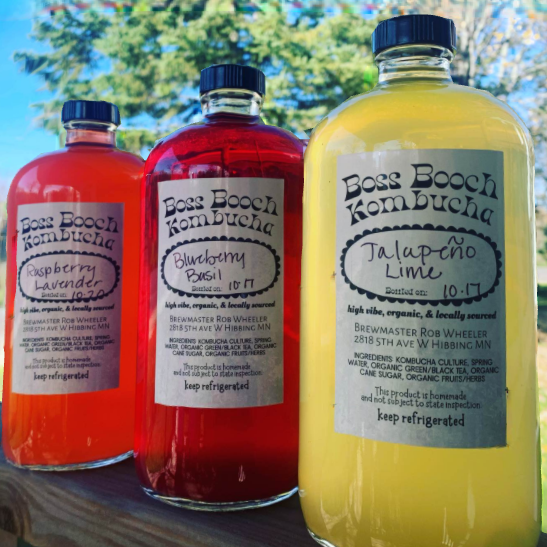Jill Burkes and Rob Wheeler at their farmers market stand selling Boss Booch
What do yogurt, kimchi, cheddar cheese, and kombucha have in common? Right! They’re each a product of fermentation. Fermentation is the process where yeast and/or bacteria break down sugars into other chemicals without the help of oxygen. Most of us have probably eaten fermented foods without thinking about the process, or the results. My daughter started making kombucha a few years ago and I discovered that I like it. Now my partner makes it regularly in a dark cupboard in our kitchen. And more and more folks are applying for a Minnesota Cottage Food permit to make kombucha to sell at farmers markets.
Rob Wheeler of Hibbing is one of those folks. You might know him as the bearded half of the band MorningBird, but he’s also the boss of “Boss Booch.” Rob started making kombucha in 2017 and his business has slowly grown from a couple of glass gallon containers to eight or nine gallons on the kitchen counter and eventually to ten, five-gallon brewing jars in the basement. The beverage is made from tea with sugar added. Rob uses Ceylon Black or Gunpowder Green organic tea from Natural Harvest Food Coop in Virginia. He adds organic cane sugar, and then the scoby. Scoby stands for Symbiotic Culture Of Bacteria and Yeast. It’s a gelatinous blob of pale brown stuff that actually looks revolting. But it does the job of transforming sweetened tea into a beverage full of probiotics and stuff that’s good for your gut. It also seals off the brew from air and any bad bacteria that might be in the air. The magic happens under the scoby, in a dark room that’s reasonably cool.
Rob adds flavor after the initial thirty-day fermenting and lets it ferment another two to three days. His flavors are unique—he forages them across northern Minnesota, especially at his cabin on Crane Lake. Or he grows them in his herb garden at home. Chagga from the woods, wild berries of every kind, wild plums, and apples make it into his kombucha as well as basil, lavender and rosemary from the garden. Rob says the foraging is his favorite part of making the brew. And his customers love the flavors, especially kombucha flavored with basil. After the three day flavor ferment, he bottles it, then adds a bit of organic cane sugar and lets it sit another week. That’s when the tiny bit of natural carbonation forms in the kombucha.
Thirty-two ounce Boston Round bottles are his preference and he also sells sixty-four ounce growlers—all in returnable bottles. Rob has a Cottage Food “license,” which is actually an exemption from a more institutional license according to the Minnesota Department of Agriculture. It requires training and an annual fee along with registration with the Department. Rob uses PBW, also known as a brewery cleaner, and boiled water to wash the bottles in a stainless steel sink. They are rinsed in boiled water and then baked in the oven for twenty minutes at 180 degrees. Then they’re ready to fill.
You can find all kinds of health claims about kombucha on the Internet, but I wanted to dig a bit deeper for information on its content and its benefits. I found two very helpful articles. The first, from the UCLA School of Medicine, published in the professional journal Nutrients in 2022, measured the microbial and chemical profiles of nine commercial kombucha products. The second, from Stanford University, published in the journal Cell in 2021, reports on a seventeen-week randomized study of two diets and their impact on the immune system. One of the diets was high in fermented items. The results are very encouraging. Here’s a summary.
The first study on the content of kombuchas found large differences in the chemical and microbial profiles of kombuchas, but all for the good. The interactions between bacteria and yeasts (in the scoby), they found, lead to the formation of a wide range of “bioactive metabolites” including vitamins and amino acids. These live microbes are what we call “probiotics,” and folks drink kombucha to add probiotics to their gut microbiome. Your gut microbiome lives in your digestive tract and is linked to your health in powerful ways. Kombucha, made from tea, also contains tea polyphenols, known for their antioxidant qualities. If you want to pursue this, you can read the research here: https://www.mdpi.com/2072-6643/14/3/670
The second study looked at the health impacts of two diets, one high in fiber and the other high in fermented foods. They found that the diet with abundant fermented foods increased gut microbiota diversity (a good thing) and decreased inflammation. Inflammation is associated with non-communicable chronic diseases that are on the rise around the world—think diabetes, cancer, cardiovascular diseases. And a decrease in inflammation means a boost for the immune system. If you’d like to pursue this, you can read the study here: https://www.ncbi.nlm.nih.gov/pmc/articles/PMC9020749/
Overall, kombucha and other fermented foods are a good thing. And you’ll be able to find Boss Booch’s awesome flavored brew at the Virginia Market Square farmers market this summer! We’ll see you there June 15!

